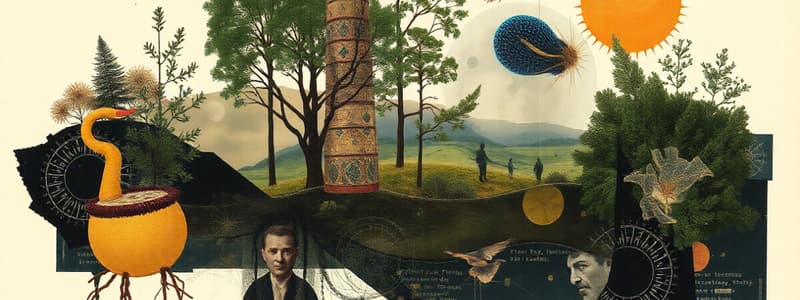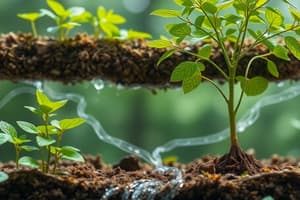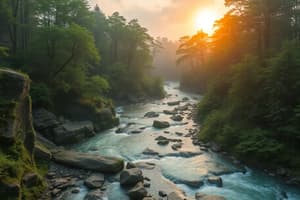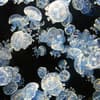Podcast
Questions and Answers
What is the scientific study of life known as?
What is the scientific study of life known as?
- Ecology
- Botany
- Biology (correct)
- Zoology
Which of the following levels of organization is NOT part of the biological hierarchy?
Which of the following levels of organization is NOT part of the biological hierarchy?
- Cellular
- Organismal
- Molecular
- Atmospheric (correct)
Darwin’s theory of evolution includes two main concepts. What are they?
Darwin’s theory of evolution includes two main concepts. What are they?
- Speciation and extinction
- Natural selection and descent with modification (correct)
- Genetic drift and mutation
- Adaptation and survival of the fittest
What is one property of living organisms?
What is one property of living organisms?
What can the study of biology help us understand regarding our appearance?
What can the study of biology help us understand regarding our appearance?
Which of the following questions can be answered by studying biology?
Which of the following questions can be answered by studying biology?
Why is it important to eat fruits and vegetables according to biological principles?
Why is it important to eat fruits and vegetables according to biological principles?
What aspect of biology explains why we age?
What aspect of biology explains why we age?
What is the primary role of producers in an ecosystem?
What is the primary role of producers in an ecosystem?
How does energy typically flow through an ecosystem?
How does energy typically flow through an ecosystem?
What is the main function of consumers in an ecosystem?
What is the main function of consumers in an ecosystem?
Which statement best describes the role of sunlight in an ecosystem?
Which statement best describes the role of sunlight in an ecosystem?
What defines a cell in biological terms?
What defines a cell in biological terms?
Which of the following best describes the nutrient cycling process in ecosystems?
Which of the following best describes the nutrient cycling process in ecosystems?
In an ecosystem, what happens to chemical energy produced by plants?
In an ecosystem, what happens to chemical energy produced by plants?
What is the lowest level of biological organization that can perform all activities required for life?
What is the lowest level of biological organization that can perform all activities required for life?
What is the main focus of deductive reasoning in hypothesis-based science?
What is the main focus of deductive reasoning in hypothesis-based science?
What characteristic defines a scientific theory?
What characteristic defines a scientific theory?
Why can science not address supernatural phenomena?
Why can science not address supernatural phenomena?
In designing controlled experiments, what must be established?
In designing controlled experiments, what must be established?
What is the estimated total number of cells that are created during a human's lifetime?
What is the estimated total number of cells that are created during a human's lifetime?
How many cells does the human body contain approximately?
How many cells does the human body contain approximately?
How often do new cells die and are created in the human body?
How often do new cells die and are created in the human body?
Which of the following statements is true about living organisms?
Which of the following statements is true about living organisms?
What does the term 'descent with modification' imply?
What does the term 'descent with modification' imply?
Which of the following best describes natural selection?
Which of the following best describes natural selection?
Which kingdoms are classified as prokaryotes?
Which kingdoms are classified as prokaryotes?
What significant work did Charles Darwin publish in 1859?
What significant work did Charles Darwin publish in 1859?
Which statement about evolutionary change is true?
Which statement about evolutionary change is true?
What concept did Darwin propose to explain the diversity of species?
What concept did Darwin propose to explain the diversity of species?
How can the evolutionary relationships among species be visualized?
How can the evolutionary relationships among species be visualized?
What does each twig on the evolutionary tree represent?
What does each twig on the evolutionary tree represent?
How does the tree of life illustrate the interconnectedness of species?
How does the tree of life illustrate the interconnectedness of species?
Which finch type primarily feeds on seeds?
Which finch type primarily feeds on seeds?
Which finch is categorized under 'tree finches'?
Which finch is categorized under 'tree finches'?
What common ancestor is suggested for the finches mentioned?
What common ancestor is suggested for the finches mentioned?
Which feature best describes the evolutionary tree?
Which feature best describes the evolutionary tree?
What characteristic distinguishes insect-eating finches from seed-eating finches?
What characteristic distinguishes insect-eating finches from seed-eating finches?
What aspect of evolution does the tree of life emphasize?
What aspect of evolution does the tree of life emphasize?
Flashcards
What is a cell?
What is a cell?
The fundamental unit of life, responsible for all life processes.
How does energy enter an ecosystem?
How does energy enter an ecosystem?
Producers convert light energy into chemical energy through photosynthesis.
What is evolution?
What is evolution?
The process of change in inherited characteristics of populations over generations.
What is biology?
What is biology?
Signup and view all the flashcards
What is natural selection?
What is natural selection?
Signup and view all the flashcards
What is nutrient cycling?
What is nutrient cycling?
Signup and view all the flashcards
What is energy flow?
What is energy flow?
Signup and view all the flashcards
What are consumers?
What are consumers?
Signup and view all the flashcards
What are producers?
What are producers?
Signup and view all the flashcards
What are prokaryotes?
What are prokaryotes?
Signup and view all the flashcards
What are eukaryotes?
What are eukaryotes?
Signup and view all the flashcards
What is the tree of life?
What is the tree of life?
Signup and view all the flashcards
What is descent with modification?
What is descent with modification?
Signup and view all the flashcards
What is deductive reasoning?
What is deductive reasoning?
Signup and view all the flashcards
What are controlled experiments?
What are controlled experiments?
Signup and view all the flashcards
What is a scientific theory?
What is a scientific theory?
Signup and view all the flashcards
What is falsifiability?
What is falsifiability?
Signup and view all the flashcards
What is reproducibility?
What is reproducibility?
Signup and view all the flashcards
How many cells are there in the human body?
How many cells are there in the human body?
Signup and view all the flashcards
How many cells are created during a lifetime?
How many cells are created during a lifetime?
Signup and view all the flashcards
At what rate are cells created and destroyed?
At what rate are cells created and destroyed?
Signup and view all the flashcards
What is the definition of biology?
What is the definition of biology?
Signup and view all the flashcards
What is photosynthesis?
What is photosynthesis?
Signup and view all the flashcards
What is metabolism?
What is metabolism?
Signup and view all the flashcards
What is a population?
What is a population?
Signup and view all the flashcards
What is an ecosystem?
What is an ecosystem?
Signup and view all the flashcards
What is genetic variation?
What is genetic variation?
Signup and view all the flashcards
Study Notes
Ecosystem Dynamics
- Two major processes occur within an ecosystem: cycling of nutrients and energy flow.
- Nutrients obtained by plants are eventually returned to the soil.
- The energy flow begins with sunlight, then moves to producers, then to consumers.
- Producers convert light energy into chemical energy through photosynthesis.
- Consumers cannot perform photosynthesis and feed on producers or other consumers.
Energy Flow Through an Ecosystem
- Energy typically enters an ecosystem as sunlight and exits as heat.
The Cell
- The cell is the fundamental structural and functional unit of every organism.
- It is the lowest level of organization that can perform all activities necessary for life.
The Biology of Life
- Biology is the scientific study of life.
- The field aims to understand how life works.
- All organisms can be classified into various kingdoms.
- Prokaryotes include bacteria and archaea.
- Eukaryotes include plants, animals, fungi, and protists.
Evolution
- Evolution is the process of change in inherited characteristics of populations over generations.
- Charles Darwin’s theory of evolution was proposed in 1859.
- His theory includes two main points: descent with modification and natural selection.
Descent with Modification
- Present-day species originated from a series of ancestral species.
- Modifications occurred throughout their evolutionary history.
Natural Selection
- Organisms better suited to their environment are more likely to survive and reproduce.
- This leads to a greater proportion of individuals with advantageous characteristics in a population.
The Tree of Life
- Darwin proposed that ancestral species can split into descendant species.
- This branching pattern creates a "tree of life," showing the relationships between species.
The Logic of Hypothesis-Based Science
- Deductive reasoning uses general principles to draw specific conclusions.
- If a hypothesis is accurate, it should lead to predictable outcomes.
- Controlled experiments are designed to test the effects of one variable while minimizing the impact of others.
Scientific Theory and Limitations of Science
- Scientific theories are comprehensive, generate new hypotheses, and have extensive evidence.
- Science cannot address supernatural phenomena because its hypotheses must be testable and falsifiable, and results must be reproducible.
The Cell as the Unit of Life
- All living organisms are comprised of cells.
- The human body has 200 different types of cells, all stemming from a single fertilized egg.
Cell Numbers
- There are approximately 10^13 cells in the human body.
- An estimated 10^16 cells are created during a lifetime.
- Cells are constantly being created and destroyed at a rate of 10^7 cells per second.
Animals and Cells
- Animals are also made of cells.
- The existence of cells is universally recognized in animal life.
Studying That Suits You
Use AI to generate personalized quizzes and flashcards to suit your learning preferences.
Related Documents
Description
Explore the dynamics of ecosystems, energy flow, and the fundamental structures of life in this biology chapter. Understand how nutrients cycle within ecosystems, the role of producers and consumers, and the cellular organization of living organisms. This quiz covers essential concepts in the field of biology.





